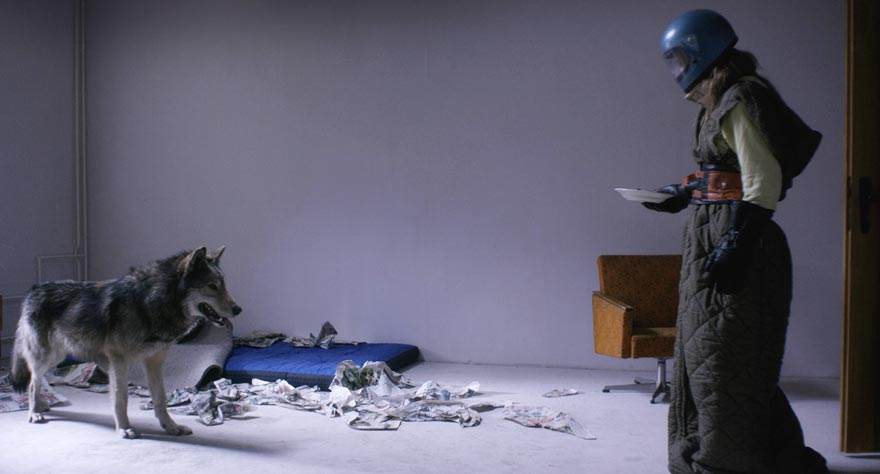Tuesday, 4 October 2016
At the LFF: "Wild"
The 60th BFI London Film Festival opens tomorrow night with the UK premiere of Amma Asante's A United Kingdom, and runs until the 16th October at various locations around the city. As ever, it's my intention to run selected longer reviews of featured titles on this blog, while dispatching daily capsule reviews (and other stray thoughts) via Twitter - you can find me here.
How to let off steam in our ever more stressful and demanding modern world? For some, the answer lies in reiki or spin class; others turn to alcohol, sex and drugs. For the heroine of the new German black comedy Wild, it appears to lie in a return to nature. Nicolette Krebitz's film introduces us to Ania (Lilith Stangenberg), a meek, lonely secretary who experiences a revelation on her work to work one morning when she comes eye-to-eye with a wolf lingering on an especially desolate scrap of wasteland. Between the call of the wild and the call of her desk, there seems barely a choice: Krebitz sets up a cold, hard, brusque universe - mostly drudgery, where you can't even step off the bus without some stranger barging his way past you - which might very well send a sane person running off into the woods, away from those brutes and control freaks who seek to crush us or tie us in knots.
Yet Wild never loses sight of the idea its heroine might be a pretty strange creature in her own right. Ania's a cross between the unworldly teacher of Maren Ade's The Forest for the Trees, Chris McCandless, alienated hero of Into the Wild, and Timothy Treadwell, subject of Herzog's Grizzly Man: far more comfortable around animals than humans, she comes to regard the wolf as a best friend, ideal flatmate or dream lover she must have, and is then seen going out of her way to get him. I use the masculine pronoun, as the bulk of what follows plays out as a live-action beauty-and-the-beast romance we're pretty certain can't end well, given Krebitz's realist tenor and the prevailing laws of nature. Even so, there's an undeniable fascination in watching our heroine buy the bait, set the traps, ready the tranquilisers and eventually get the wolf indoors, in one nocturnal stroke promoting herself up the food chain. Who's the predator now?
Stangenberg's spooky, obsessive presence carries the film a lot of the way: the actress does have the look of someone who'd consider kissing a dog with tongues, and all the scenes between her and the (non-CG) wolf carry an electric, quasi-erotic tension. (You don't know who's going to pounce on whom first.) Krebitz deserves this year's Johnny Morris Memorial Prize for Best Onscreen Animal Handling, if only for a talking-point dream sequence that coincides with Ania's time of the month. At which point, you'll just have to acknowledge there are elements here that border on the preposterous. That Ania recruits a full team of migrant workers to assist with her mission seems unlikely, given she initially seems capable of saying boo to a goose, let alone in Mandarin; and I hope it doesn't sound sexist when I say there are certain practical elements to her plan that would seem to be beyond this thin slip of a girl. (There are moments where Krebitz appears to ask Stangenberg to play Ray Mears and Ron Swanson simultaneously, which would be a stretch for anybody.)
Still, you cannot deny that this is a film of big, bold, cinematic ideas, not least when the captive wolf decides he needs some space and promptly elects to knock the walls of Ania's poky flat clean through. Somewhere in this picture is a portrayal of sexuality, and female sexuality in particular, as a banister-humping joke, a series of wholly irrational, uncontrollable urges; depending on where the viewer is in his or her own cycle, you may take unkindly to this, or warm to Krebitz as a more puckish Catherine Breillat, one possessed of a far greater sense of humour about matters of the heart and other organs. Granted, the film's wayward in places, and less immediately readable proposition than the Reece Witherspoon vehicle with which it shares its name - and yet I think it deserves that title all the more for it. Krebitz's film extends its claws, scratches at the veneer of civilised behaviour, and wonders just what it would take for us to make peace with that low-down, dirty, animalistic part of ourselves that is forever snarling and thrashing around.
Wild screens on Thursday 6 at the Vue West End, Friday 7 at the Curzon Mayfair, and Saturday 8 at the NFT.
Subscribe to:
Post Comments (Atom)

No comments:
Post a Comment